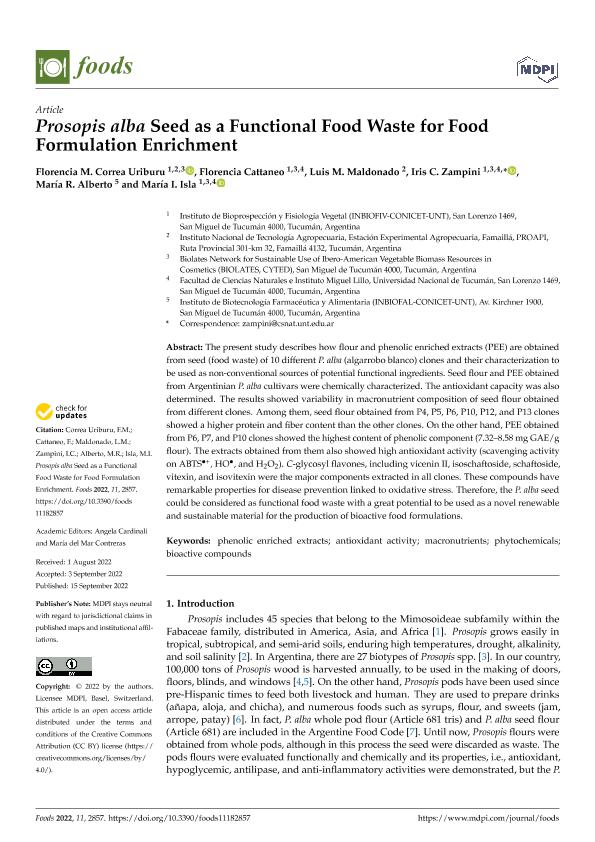Artículo
Prosopis alba Seed as a Functional Food Waste for Food Formulation Enrichment
Correa Uriburu, Florencia Maria ; Cattaneo, Florencia
; Cattaneo, Florencia ; Maldonado, Luis María; Zampini, Iris Catiana
; Maldonado, Luis María; Zampini, Iris Catiana ; Alberto, Maria Rosa
; Alberto, Maria Rosa ; Isla, Maria Ines
; Isla, Maria Ines
 ; Cattaneo, Florencia
; Cattaneo, Florencia ; Maldonado, Luis María; Zampini, Iris Catiana
; Maldonado, Luis María; Zampini, Iris Catiana ; Alberto, Maria Rosa
; Alberto, Maria Rosa ; Isla, Maria Ines
; Isla, Maria Ines
Fecha de publicación:
09/2022
Editorial:
MDPI
Revista:
Foods
ISSN:
2304-8158
Idioma:
Inglés
Tipo de recurso:
Artículo publicado
Clasificación temática:
Resumen
The present study describes how flour and phenolic enriched extracts (PEE) are obtained from seed (food waste) of 10 different P. alba (algarrobo blanco) clones and their characterization to be used as non-conventional sources of potential functional ingredients. Seed flour and PEE obtained from Argentinian P. alba cultivars were chemically characterized. The antioxidant capacity was also determined. The results showed variability in macronutrient composition of seed flour obtained from different clones. Among them, seed flour obtained from P4, P5, P6, P10, P12, and P13 clones showed a higher protein and fiber content than the other clones. On the other hand, PEE obtained from P6, P7, and P10 clones showed the highest content of phenolic component (7.32–8.58 mg GAE/g flour). The extracts obtained from them also showed high antioxidant activity (scavenging activity on ABTS•+, HO•, and H2O2). C-glycosyl flavones, including vicenin II, isoschaftoside, schaftoside, vitexin, and isovitexin were the major components extracted in all clones. These compounds have remarkable properties for disease prevention linked to oxidative stress. Therefore, the P. alba seed could be considered as functional food waste with a great potential to be used as a novel renewable and sustainable material for the production of bioactive food formulations.
Archivos asociados
Licencia
Identificadores
Colecciones
Articulos(CCT - NOA SUR)
Articulos de CTRO.CIENTIFICO TECNOL.CONICET - NOA SUR
Articulos de CTRO.CIENTIFICO TECNOL.CONICET - NOA SUR
Articulos(INBIOFAL)
Articulos de INSTITUTO DE BIOTECNOLOGÍA FARMACEUTICA Y ALIMENTARIA
Articulos de INSTITUTO DE BIOTECNOLOGÍA FARMACEUTICA Y ALIMENTARIA
Citación
Correa Uriburu, Florencia Maria; Cattaneo, Florencia; Maldonado, Luis María; Zampini, Iris Catiana; Alberto, Maria Rosa; et al.; Prosopis alba Seed as a Functional Food Waste for Food Formulation Enrichment; MDPI; Foods; 11; 18; 9-2022; 1-14
Compartir
Altmétricas



